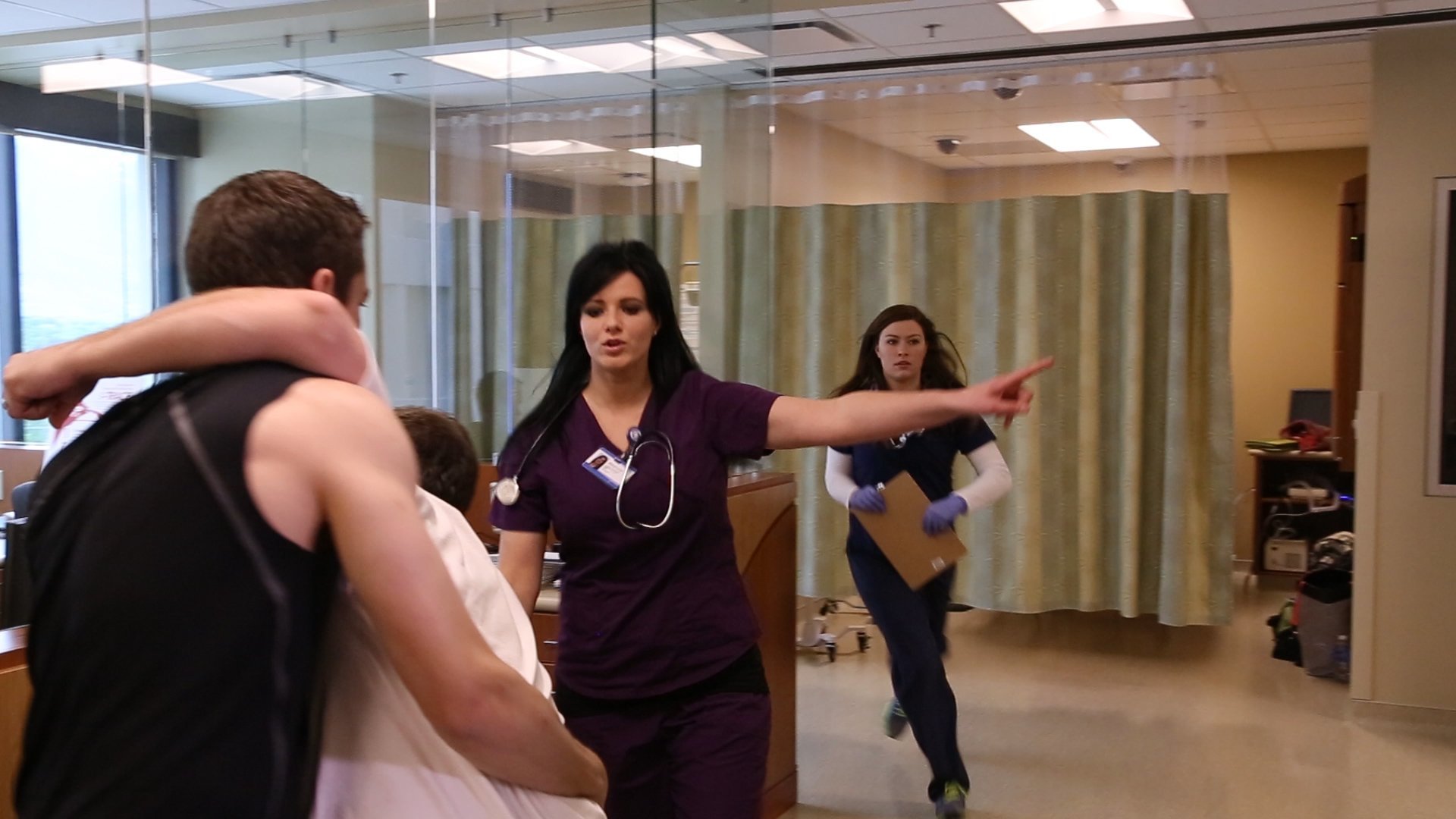How to Become a Trauma Nurse

Trauma nursing is no walk in the park. And it’s not for the faint of heart, either. It’s a dynamic and stressful environment where patients with critical and life-threatening injuries come seeking help. From people who’ve been in car accidents to individuals who were shot were stabbed – no injury is unheard of in the trauma department.
However, that does not scare you one bit. You do your best in crisis situations. You keep your cool and are ready to get to work at a moment’s notice. You are composed, fast-thinking, and detail-oriented. Precise task management and outstanding communication skills are your allies. And you do not want a workplace where two days are ever the same. In that case, trauma nursing may be the career for you.
Are you curious to find out more about this specialty? We got your back. Read on to find out more about what the specialty is all about, how to become a trauma nurse, what are your salary prospects, and more. If you’ve got questions about being a Trauma Nurse, we have the answers.
What is a Trauma Nurse?
Trauma Nurses stand at the very front lines of emergency care. They work in the Emergency Department and care for patients who come in or are brought in by emergency service teams displaying severe and potentially life-threatening injuries. This can mean work accidents, burns, stabbings, car crashes, or more. Accidental wounds, self-inflicted injuries, or brutal crimes – no matter what lands the patient in the ER, Trauma Nurses are the first responders in the ED who will care for them. Their objective is to stabilise the patient and make sure the injured gets to see another day. Trauma Nurses work very closely with emergency transport teams, ED physicians, trauma surgeons, and other healthcare professionals.

How to Become a Trauma Nurse?
The pathway to becoming a Trauma Nurse is pretty clear-cut. There are several steps you need to complete to enter this challenging field of work:
- Enroll in a nursing program & complete it
- Pass the NCLEX-RN exam
- Get your scrubs on
- Get certified
- Start working
- Don’t forget about continuing education
Let’s glance over these steps one by one and analyze what are the education and certification requirements that will put you on a Trauma nursing path.
1. Enroll in a nursing program & complete it
Luckily for you, there are several options available to you when it comes to nursing programs.
- Associate’s Degree in Nursing. This nursing program takes around two years to complete and is the fastest way to get RN licensure.
- Diploma programs. These take around three years to complete and are more often hospital-based. This option is less popular nowadays
- Bachelor’s Degree in Nursing. Completion of this type of nursing program takes around four years. In the end, you’ll be a BSN-trained nurse, which is increasingly becoming the gold standard in the field of nursing.
When choosing a nursing program, it’s best to opt for an accredited program. Among many other benefits, a nursing school’s accreditation will ensure your possibility to access federal financial aid and will guarantee that you can sit for the licensure exam. So, when choosing what nursing program to enroll in, make sure you ask the institution about its accreditation.
Find out more about how to choose the right nursing school and program.
2. Pass the NCLEX-RN exam
Upon completion of the nursing program, there’s one more stumbling block you have to overcome. You need to successfully complete the NCLEX-RN exam and gain licensure as a Registered Nurse. Only after passing the exam can you officially apply for a Registered Nurse job.
3. Get your scrubs on
Before you can get fully certified as a Trauma Nurse, you will have to gain some work experience. Usually, around two years of job experience in the chosen specialty area are required as an eligibility criterion for certification.
The time you have to spend working before you can pursue certification will prove invaluable. You get first-hand experience in your specialty area and that will help you become the best Trauma Nurse you can be.
Generally, in the last year of your BSN studies, you’ll get to choose a department that interests you. So, it may be a good idea to give the Emergency Department and critical care nursing a go. It’s a good way to see if you are cut-out for a career as a Trauma Nurse.

4. Get certified
Now that you have some work experience under your belt, the next step is to earn a certification in trauma nursing. The Board of Certification for Emergency Nursing, the main certifying body in this specialty area states that “when disaster strikes and every second matters, TCRNs are there to impact lives.” Their expertise, knowledge, and skills will be proven by successful completion of the certification exam.
The eligibility requirements you should meet in order to sit for the Trauma Certified Registered Nurse exam and receive your credential are the following:
- You must hold a current and unrestricted Registered Nurse license in the United States.
- You should have two years of experience in your specialty area. Although this is highly recommended by the BCEN, it is not required.
5. Start working
Completed education? Check! Required professional credential? Also, check. You are now ready to apply to Trauma Nursing positions, start your career and strive for excellence in this demanding field. Make sure your nursing resume stands out and confidently apply to the jobs you want.
6. Don’t forget about continuing education
The Trauma Certified Registered Nurse (TCRN) credential is valid for four years. After that, recertification for your TCRN status is required every four years. It is your responsibility to keep track of the certification expiration date and to ensure you get recertified in time. In order to do that, you must have completed 100 contact hours of nursing continuing education within your current 4-year recertification period.
In addition to TCRN certification, another great option for nurses that want to advance their knowledge and practice and grow their Trauma Nursing career is the Trauma Nursing Core Course offered by the Emergency Nurses Association.
You can also consider courses in areas such as Pediatric Emergency, Advanced Trauma Nursing, Geriatric Emergency, Flight Nursing, and others.
This sixth step in our How to become a Trauma Nurse list is so important because healthcare is continuously changing and evolving. As a Trauma Nurse, always staying on top of new information and best practices is essential.

Read more about the importance of continuing education in nursing and what makes it fundamental to the practice of nursing.
How Long Does it Take to Become a Trauma Nurse?
We talked about all the steps required to become a Trauma Nurse, but how long does it actually take to start your career in this specialty area? That, of course, depends on the educational choices you make along the way, but in general, it will take between four and six years to become a Trauma Certified Registered Nurse.
Should you pursue an ADN degree, transitioning into a Trauma Nurse position should take you around four years. However, going the BSN route, although lengthier, might be the better option, as BSN nurses are not only better prepared, but they also enjoy more job opportunities, higher salaries and are given preference by healthcare employers.
If you already have an ADN degree and would like to advance your studies, you can do so in less time by pursuing an RN-to-BSN bridge program.
After completing your education, you should spend at least two years working, preferably as an Emergency Room staff nurse. Getting proper hands-on training in the ER will prepare you better for the life of a Trauma Nurse.
What Does a Trauma Nurse Do?
In broad terms, Trauma RNs are responsible for stabilizing and monitoring the trauma patient, for actively performing procedures, for assessing and relieving the injured person’s pain, and for educating and comforting the patient and their family.
More specifically, some of the duties and responsibilities that Trauma Nurses have to carry out every day include:
- Assessing and triaging patients based on the acuity of their condition
- Administering first aid or advanced life support when needed. This can include performing CPR, cardiac monitoring, defibrillation, administering advanced medication, delivery of oxygen, or other techniques.
- Monitoring and accurately recording the situation of trauma patients while in their care
- Inserting IVs, administering IV medications and fluids
- Cleaning and dressing wounds
- Get the patients ready for diagnostic tests
- Preparing the patients for surgery
- Closely observing a patient’s state and reporting possible symptoms of deterioration of one’s health status
- Working in tandem with physicians, trauma surgeons, and other members of the healthcare staff
- Communicating with the patient and their family to help them get over the traumatic injuries
- Educating patients on how to manage their wounds or condition once they are discharged
- Cooperating with law enforcement when the trauma is the result of criminal activity
The situations a Trauma Nurse will have to handle are often chaotic and complex. Some of the cases they may encounter are:
- Car (or other vehicular) accidents
- Stab wounds
- Gunshot wounds
- Drownings
- Victims of assault or abuse
- Head injuries
- Burn victims

Trauma Nurse vs. ER Nurse
Sometimes people will use these two terms: Trauma Nurse and ER Nurse interchangeably. However, there is a slight difference between these two nursing roles and their job descriptions. Mainly, the differences revolve around the condition of the patient that’s being treated.
Emergency Room RNs provide care to patients who are mostly coherent, they can talk, drive themselves into the Emergency room, explain their symptoms, the source of their pain or injury. Typically, ER Nurses care for ill or sick patients.
Trauma Registered Nurses, on the other hand, deal with patients for whom “ill” is an understatement of their condition. These are patients who had to be rushed into the ER with serious wounds and injuries. They are in need of serious and urgent medical attention. Many hospitals, especially the bigger ones will have a special department devoted to these patients – the Trauma Center.
Where Do Trauma Nurses Work?
Even though their job is quite specific, Trauma Nurses can work in a variety of settings. Some of these include:
- Emergency Rooms
- Trauma Centers
- Intensive Care units
- Med/surgical units
- Ambulance transport
- Medical flights
- Burn units
How Much Do Trauma Nurses Earn?
According to ZipRecruiter, the average annual pay for Trauma Nurses is $91,025. This is the equivalent of approximately $43.76 hourly. How much a Trauma Nurse earns will vary depending on location, employer, years of experience, scope of practice, and other factors. Continuing education and certifications will also lead to higher paychecks and better benefits.
Still, the average Trauma Nurse salary is significantly higher compared to the average wages of Registered Nurses. Per the Bureau of Labour Statistics, in 2020, the mean RN salary was $80,010. So, pursuing this specialty counts for about $11,000 difference in pay prospects.

Is There Demand for Trauma Nurses?
Not only do Trauma Nurses earn competitive salaries, they are also in high demand. First of all, the need for nurses is corroborated by the Bureau of Labor Statistics. According to projections put forward by the BLS, the field of Registered Nursing will enjoy a 7% growth in employment by the end of the decade. Since Trauma Nurses fall into the RN category, they will also enjoy this better-than-average job outlook.
However, there are also other more specific indicators that Trauma Nurses will keep being in demand.
According to the Centers for Disease Control and Prevention (CDC), injuries are the leading cause of death for people aged between 1 and 44. In 2018 alone, there were over 24.5 million emergency department visits for unintentional injuries. That statistic – albeit unfortunate – already suggests a stable demand for this profession.
Additionally, according to the Society of Trauma Nurses and studies in the field of trauma care, as the life expectancy of the population increases, so does the risk of geriatric trauma. The most common causes of geriatric trauma include falls, collisions with motor vehicles, and other types of collisions. And as the number of older citizens grows, there will be a high incidence of traumas, hence an increased need for Trauma Nurses.
What Are the Defining Skills of a Great Trauma Nurse?
Trauma Nurses, like all nurses, have to be well trained, emphatic, patient, caring and have stamina. But in addition to all these elemental qualities, a great trauma nurse must have a combination of soft and hard skills that really sets her on a path to nursing excellence.
Some of these skills include:
- Has the ability to remain calm and collected under pressure
- Is able to handle high-stress situations
- Displays the ability to multitask. Every day in the trauma center, your duties and responsibilities will keep piling up, so you need to be able to juggle everything the work environment may throw at you.
- Is a fast thinker. Many of the decisions a Trauma Nurse will have to make will need to happen in a split second. So, you need to think fast on your feet and not waste precious time second-guessing yourself.
- Has fantastic communication skills. Trauma nursing involves a lot of collaboration with other members of the healthcare team: trauma surgeons, ambulance or medical flight crew.
- Possesses emotional strength. As a Trauma Nurse, you will be exposed to lots of pain, injury, and death. Trauma is literally in your job title. So you must be able to emotionally compartmentalize and not let the emotional fatigue get to you.

Ready to Take On the Role of Trauma Nurse?
Do you feel the frontlines of care calling your name? Is the idea of a fast-paced work environment enticing to you? Do you want a job that will always keep you on your toes? At the same time, do you want a career that pays well and will continue being in high demand? Becoming a Trauma Nurse will check all the boxes.
At Nightingale College, we want to see you achieve your goals. Our blended BSN program and our online RN-to-BSN programs will help prepare you for the intricacies of the nursing profession and will put you on the path to becoming a great Registered Nurse.
A successful Trauma nursing career starts with quality nursing education. Are you ready to pursue it?

